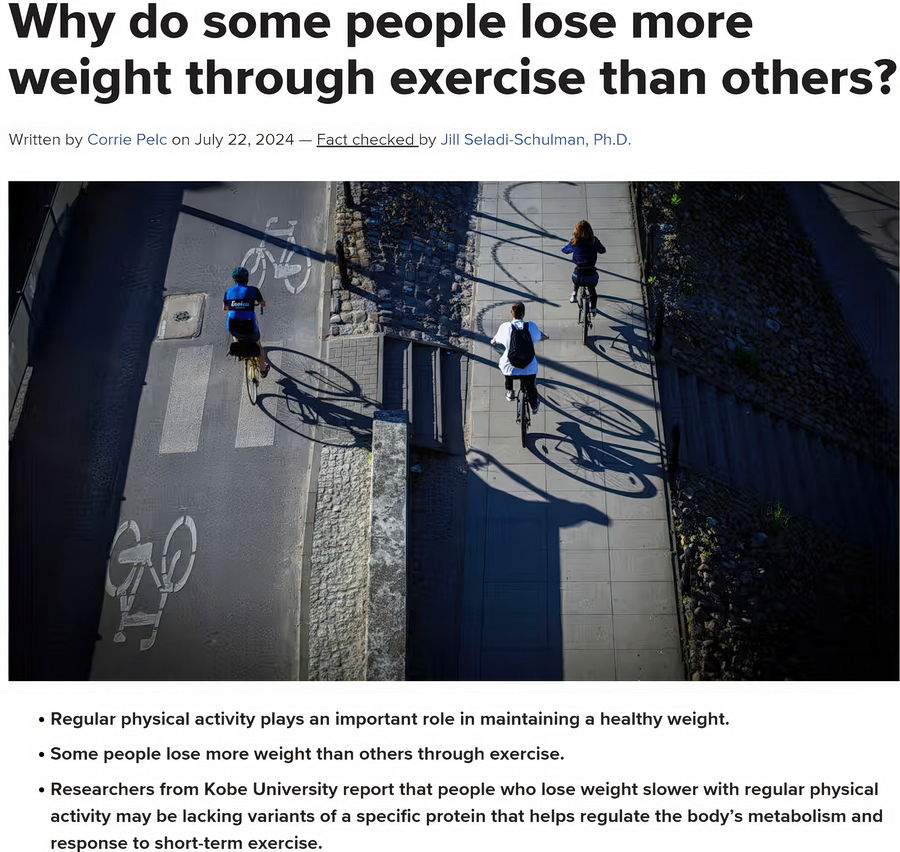Today we return to Medical News Today and their recent article on “weight loss” through the futile method of exercise. Exercise is simply stress as it tears down the body and suppresses our hormones. While some exercise is good to keep an aerobic- and strength-wise foundation, and to stimulate the lymphatic system, it is pretty useless for fat loss or weight management. You simply have to consider the negative impact versus the little extra energy that you spend, energy that you could easily mitigate through your diet. And that is why I have never used ‘cardiovascular exercise’ with my clients, not even on the elite level in bodybuilding or fitness.
So, let’s see what they’re up to this time.
“Everyone knows that regular physical activity is important to maintaining a healthy weight. However, some people lose more weight than others through exercise.”
No, it’s not. And I just explained why. If you have to rely on exercise to maintain your weight, that only means that your diet is complete shit. On our natural human carnivorous diet, it’s impossible to get fat and extremely easy to stay lean as you never get hungry and never get any cravings because you are fully nourished.
“Researchers from Kobe University in Japan say people who lose weight slower with regular physical activity may be lacking variants of the protein PGC-1α, which helps regulate the body’s metabolism and response to short-term exercise.”
Well, PGC-1α protein (Peroxisome Proliferator-Activated Receptor Gamma Coactivator 1-alpha) is allegedly (according to current “understanding”) a transcriptional coactivator that plays a central role in regulating cellular energy metabolism, especially fatty acid and glucose metabolism on a cellular level. In other words, elevated blood glucose and impaired insulin signaling will lead to decreased PGC-1α protein expression and activity. And that simply means that people who consume a shitty diet full of toxic and contraindicated carbohydrates will, over time, lower their PGC-1α protein activity and thus their response to “exercise,” as in simply using glucose and fatty acids as fuel for muscular activity.

And there is no such thing as “lacking” variants of PGC-1α, it’s simply accumulated damage from following a retarded diet, a non-human diet with plant-based foods, as in carbohydrates. Also, the other variant PGC-1β that mostly is found within skeletal muscle downregulates from repeated cellular damage, as when a lot of tissue repair is needed and there is an inflammation response. That could be from too much exercise or from toxins.

Now, that was not so hard to understand, was it? These “researchers” could need to freshen up on their understanding of human physiology and biology.
“Scientists believe this finding may open the doors for an entirely new class of weight loss medication.”
Of course they do. Why focus on what is actually important, such as a proper human diet when you can make money from drugs while people can continue to damage their bodies by eating the same shitty foods — which will lead to other diseases and even more drugs being pushed. Profit before anything else, eh?
Focusing on the PGC-1α protein
“PGC-1α enhances the expression of genes related to mitochondria, genes involved in fatty acid oxidation, and genes involved in thermogenesis, promoting efficient energy consumption in muscles.
When you exercise, the expression of PGC-1α in skeletal muscle increases, which in turn induces the expression of genes that promote efficient energy consumption. This is considered to be the mechanism by which energy is efficiently expended in muscles during exercise.”
Yes, that is the current belief of what PGC-1α does in humans.
Lacking additional versions of protein negates exercise benefits
“Through previous research, scientists have identified there is not only the normal “a” version of the PGC-1α protein, but also “b” and “c” versions that are a bit different.
These new PGC-1α versions, called ‘b’ and ‘c,’ have almost the same function as the conventional ‘a’ version, but they are produced in muscles more than tenfold more during exercise, while the ‘a’ version does not show such an increase.”
Yes, PGC-1β is produced in skeletal muscle and is believed to control mitochondrial oxidative energy metabolism. Also, PGC-1C is believed to regulate gluconeogenesis, the process by which the liver generates glucose from fatty acids, amino acids and lactate.
Both are thus needed during physical exercise. And PGC-1C especially so if you run on our natural fat metabolism and your body produces all the glucose it needs, instead of being poisoned by it through the retarded consumption of carbohydrates. That also means that consuming carbohydrates and shutting down gluconeogenesis will suppress and downregulate PGC-1C.
In a healthy human who follows our natural human diet of animal foods, none of these proteins will be suppressed.

“Using both a mouse model and human test subjects, Ogawa and his team found that not having “b” and “c” versions of PGC-1⍺ protein meant short-term activity had no impact on the body, causing less fat burn during and after a workout.”
That would mean that you have a harder time using fatty acids as fuel during muscular activity, which will interfere with your performance, and of course, cause a tiny bit of less fat to be used as fuel.
“However, when human test subjects had both “b” and “c” versions of the protein, they consumed more oxygen and had a smaller percentage of body fat than those who did not. This was seen in humans who were both healthy and with type 2 diabetes.”
The “b” version will not be downregulated by high blood glucose and impaired insulin signaling like the “a” and “c” version, it will decrease due to damage to muscle cells — which can be from too much exercise or from toxins, especially defense chemicals as found in all plant-based foods.
So, in short, all three variants can be affected by the diet by different means. And that is likely while all three, and especially the “b” and “c” versions can be really suppressed in many people — as their diets are extremely bad (high toxic load, high in carbohydrates.)
The solution is simple; stop eating non-human crap and you will heal and it will sort itself out.
Possibility of an entirely new class of weight loss medication
“If the mechanisms of weight loss through exercise become clear, it could lead to the development of better exercise therapies and, more importantly, drugs that mimic the effects of exercise.”
Become clear? Exercise is simply using your muscular system to move and do things. That requires energy. However, as I already stated, that does not mean that exercise should be used to fight obesity or fat gain. That is unnecessary stress on the body and also a waste of time.
And any kind of drug will only be a temporary band-aid, it will not fix the problem of a shitty diet.
“For the next steps in this research, Ogawa said they are conducting research on why the increase in PGC-1α b/c varies among individuals, and we are beginning to uncover some of the reasons.”
I’ve already explained this from what research is available on the subject and from what the researchers believe these PGC-1α b/c do in the human body. There are plenty of studies that show how they are affected and why they are suppressed.
Diet more important than exercise
“After reviewing this study, Mir Ali, MD, told MNT he found it to be very interesting. Obviously, we’ve known for a long time that genetics plays a big component in some of the weight gain and weight loss, so it was interesting to see that this shows a genetic component to exercise as well.”
No, genetics is a pseudo-science. While there are differences between us, most of it comes from the developing stages as a fetus and the first years of life, how well our mother was nourished while carrying us, and how we were fed as infants so we could develop properly. A lack of nutrients during these critical phases will force the body to compromise, leading to a less “developed” body. I covered this in my old article “Starting or Expanding Your Family – How nutrition and toxins influence your child.”
As for the findings in this study, these PGC-1α b/c proteins vary due to dietary factors, especially the idiotic consumption of carbohydrates and toxic plant-based foods, as well as getting exposed to environmental toxins.
“Although exercise does contribute to how well or quickly someone loses weight, Ali said he tells his patients the biggest factor in losing weight is their diet.”
Yes, finally one thing that is correct. Diet is everything, and humans are no different than any other animal. We are obligate hyper carnivores; and consuming anything other than animal-based foods will damage us severely, just as with any other animal that would deviate from their natural diet. And again, by following our species-appropriate, species-specific carnivorous diet we will heal and our body will return to its ‘set-point,’ as in our natural body weight. That is why everyone who adopts our natural human diet and is above their set-point will lose body fat, even if they consume a lot of food. When our body gets all it needs, it will slowly heal and correct itself to its best of its abilities.
So, forget about doing exercise to maintain or lose weight. Forget about moronic drugs. Adopt our natural diet and you will become the best version of you. And to speed up your fat loss, all you need to do is some fasting — which will also help with healing and detoxing. A win-win.
If you have questions or need guidance with any weight- or health related problems, or if you need help with transitioning to our natural species-appropriate carnivorous way of eating, I’m available for both coaching and consultation.

